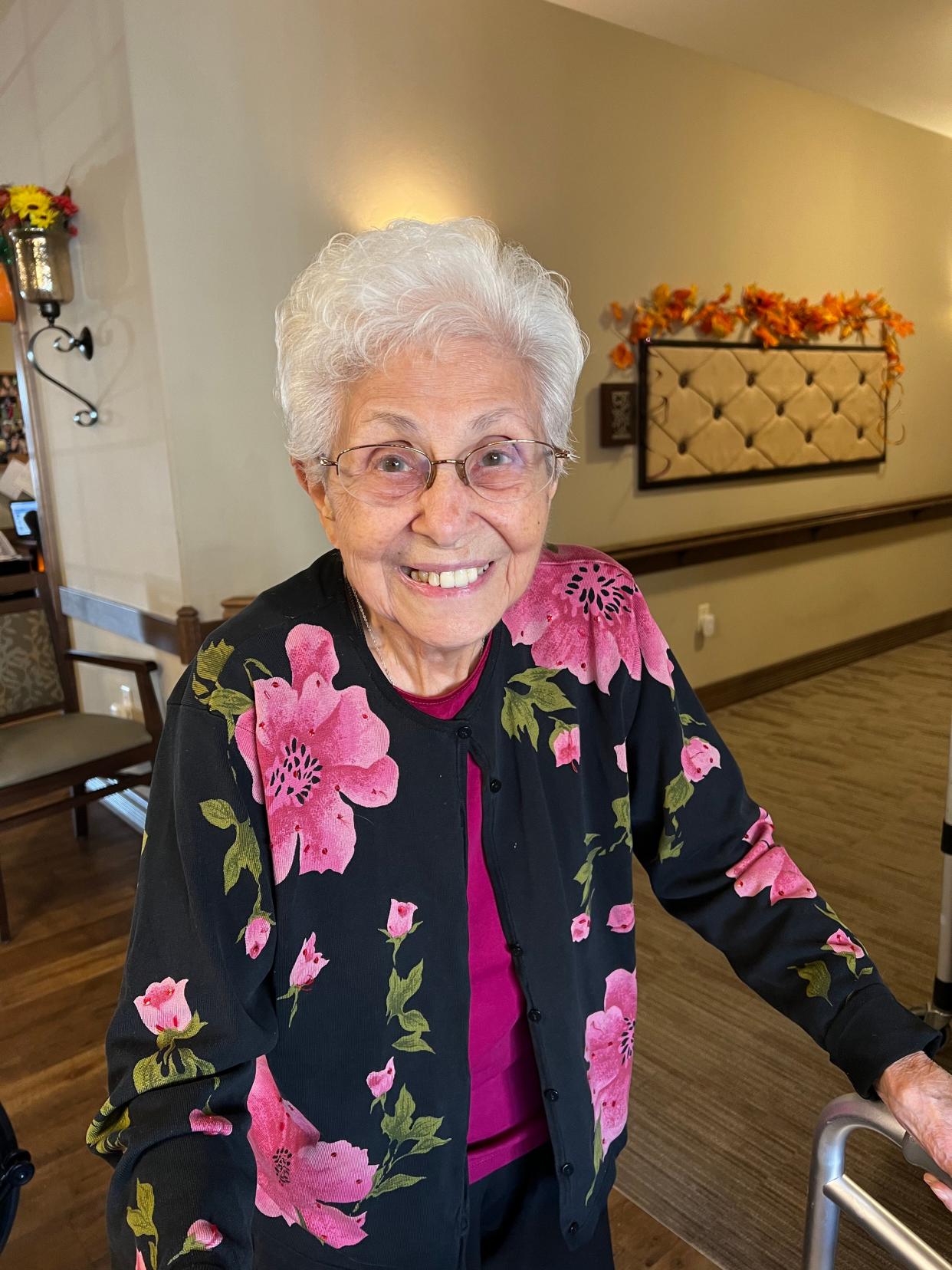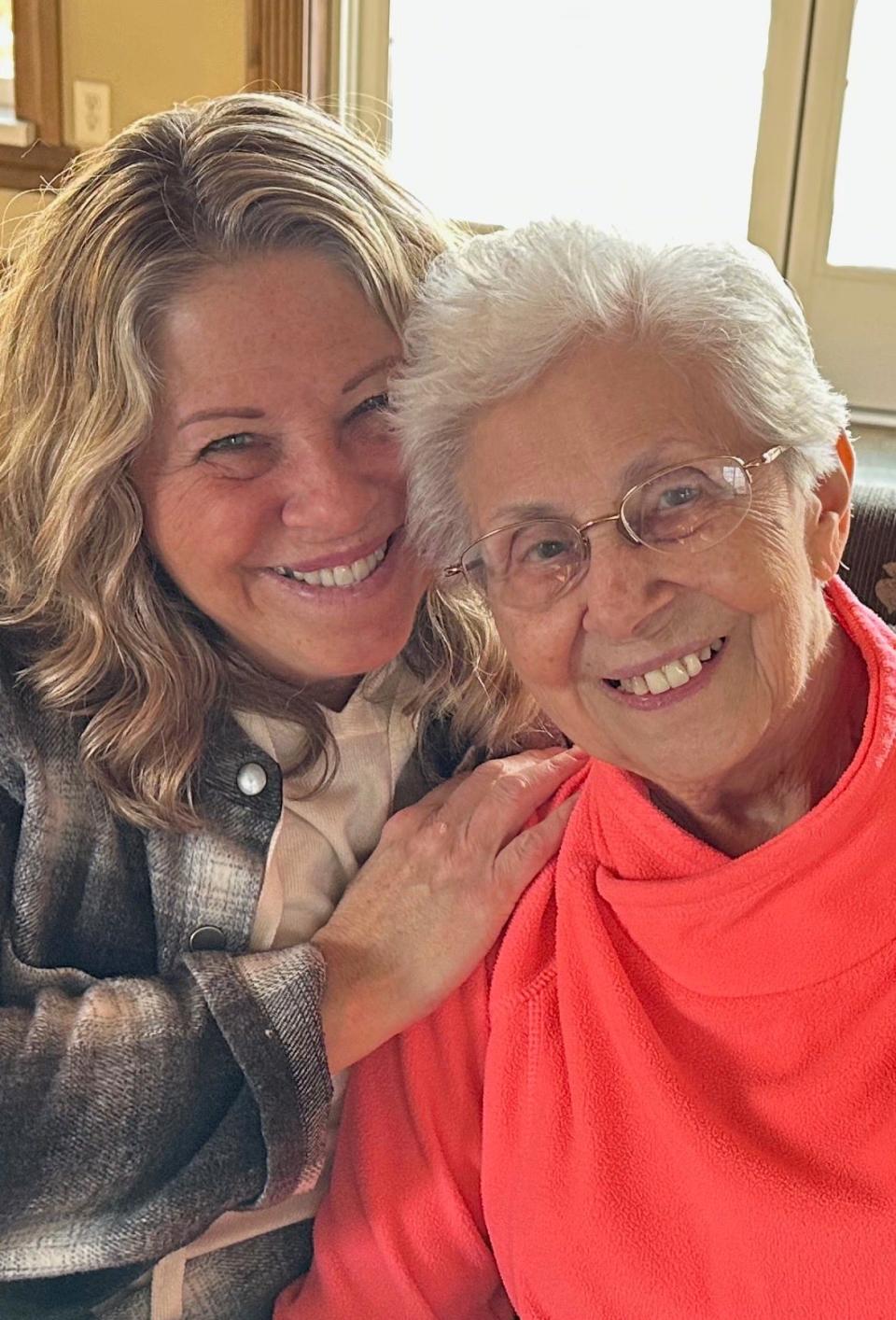'It isn't right': Resident dies 3 weeks after transferring from Emerald Bay assisted living in Hobart

If you asked someone to describe Shirley Holtz in one word, most of them would say sweet.
Holtz, 91, could usually be found smiling and laughing or singing along and harmonizing to music with others, even as her dementia progressed.
As her symptoms started to advance more rapidly, Holtz never lost her joy, her family told the Press-Gazette.
Holtz lived in Algoma most of her life. She raised her four children on her own most of the time and worked hard to provide for her family as a professional secretary for doctors in Algoma.
She had hoped that would be enough when the time came for her to move into her new home at a retirement community.
After she had a stroke, Holtz could no longer live alone and in April 2018 moved into assisted living at Emerald Bay Retirement Community in Hobart. She transitioned into a memory care unit, which provides care for residents with dementia, at the facility in 2021.
Holtz qualified for Family Care, the state’s Medicaid program created for elderly and adults with disabilities. After a resident’s financial resources run out, Family Care kicks in to cover the costs of the facility. Holtz needed to cover the costs of the facility for two years before the Medicaid reimbursements started covering her care.
After five years at the facility, Holtz was told in February she had 30 days to find a new place to live. Medicaid reimbursements were no longer keeping up with the rising costs of inflation, BAKA Enterprises — which owns Emerald Bay — said in a letter to families. So, Holtz and 14 other residents on the Family Care program had to leave the facility.
Holtz’s family was given five facilities to choose from, but they didn’t think they would provide the same quality of care.
A spot at Alpha Senior Concepts in Howard later opened up and on March 13 she moved in.
But soon after she settled in, Holtz’s children started noticing changes in their mom. She lost 15 pounds, stopped eating, and couldn’t drink water.
At Emerald Bay, she was slowly going through the stages of dementia over a few years. After she moved, “she went through the whole thing,” said Ann Marra, Holtz’s daughter.
“She went in with a walker and in less than a week, she wasn’t using her walker. She was in a wheelchair,” said Kris Holtz, Shirley's son.
Holtz passed away April 3, three weeks after move-in day. Her family believes that the impact of moving her into another facility, commonly referred to as transfer trauma, led to her decline and ultimately her death.
As her family grieves their mom, Holtz’s children are left frustrated at a system they say didn’t take care of her when she really needed it. Advocates say the resident dismissals are a sign that the Medicaid system for seniors needs change, but it’s complicated. Meanwhile, families are left wondering what to do when their loved one with dementia has to uproot everything into a new home.

RELATED: Long-term care facilities are struggling to keep vulnerable residents on Medicaid across Wisconsin
What happens after dismissal from a facility
Holtz's family have been trying to sift through the mix of emotions of loss and anger.
They could tell the move affected Holtz and led to her decline. The staff at Alpha Senior Concepts was great and helpful toward their mom, but the transfer was just too much for someone with dementia like their mom to handle, Marra said.
"The move really expedited the process," Marra said.
Kate Kahles, program manager of the Alzheimer’s Association Wisconsin chapter, has seen a trend of long-term care facilities struggling to keep up with rising costs amid low Family Care payments. It's an issue that has regularly come up in area support group meetings, she said.
Discharges reflect a larger problem in the system of how seniors afford long-term care.
It’s a difficult situation for all the families, residents, staff, and providers impacted, said Rick Abrams, CEO and president of the Wisconsin Health Care Association and Wisconsin Center for Assisted Living.
Residents living in memory care, or dementia-care units, are more medically fragile, typically requiring more care for their needs than others living in assisted living. Memory care units also tend to cost more than other units because of the level of care.
Holtz had to pay about $6,700 a month for memory care at Emerald Bay.
Long-term care providers can decide whether they want to be a provider for people in Family Care and how many Family Care residents they will take into the facility depending on the revenue they will bring in. A managed care organization will negotiate with the facility to set a reimbursement rate for the resident.
Emerald Bay's Medicaid reimbursement rates cover less than half of the residents' costs, Katherine Tegen, CEO of BAKA Enterprises, told the Press-Gazette after the letter went out in January. Due to increased costs of living, higher staff wages, inflation, the Medicaid rate no longer sustains the residents, Tegen said.
Providers are required to give residents at least 30 days' notice if they will be discharged from a facility under state law. But they won’t be discharged until they find another adequate facility agreed upon by the MCO and family even if the search goes beyond a month, Abrams said.
Lakeland Care, a managed care organization in contract with Emerald Bay, said in a statement that all residents who were transferred from Emerald Bay were "successfully moved."
"It is important for members and our communities to know that no member will be displaced until a safe and secure placement is found," the statement said.
Holtz's children, though, have come to understand that no move is secure for residents with dementia. While those in assisted living can better understand the transfer, the smallest change can make a profound impact on them.
"Moving someone out of memory care — there's just no reason for it," said Kris Holtz.
To address the issue, Gov. Tony Evers called for implementing a rate band system, or fee schedule, in his budget proposal based on recommendations from the Task Force on Caregiving. The proposal system would include built-in increases based on inflation annually. In the current system, the facility and MCO negotiate a rate for each Family Care resident.
Instead, the fee schedules would create categories of residents based on their needs and set a rate for each category, and reduce the chances of discharges from facilities, Abrams said.
"Creation of the fee schedules will bring predictability in how much facilities are going to get paid," Abrams said.
Marra and Holtz have turned their grief into advocacy. They’ve reached out to local lawmakers to share their mom’s story so others don’t have to go through her trauma.
“She worked hard all her life, paid taxes all her life, and never got on medical assistance from the government at all until now when she really needed it,” Marra said. “It isn’t right.”
The trauma of change
It can be particularly difficult for residents with memory loss like Holtz to relocate because it’s common for residents with dementia or Alzheimer’s to advance more quickly when they go into a new environment, Kahles said.
It can happen when they switch rooms in a facility, go to the emergency room in a hospital, or move to a new facility entirely. Often called transfer trauma, or relocation stress syndrome, residents with dementia can feel a great deal of fear or anxiety when they are unfamiliar with the new space.
If their loved one is in the early stages of dementia, try to include them in the process to decide where they want to move, she said. How you discuss the move with them can impact them, too. If family members can calmly tell them that they will be moving into a new facility, that will help ease their loved one as well.
With any big change, loved ones with dementia can experience an increase in depression or feeling of isolation which can exacerbate their dementia symptoms, Kahles said.
Family and staff should pay attention to any mood changes or if they are becoming more withdrawn and communicate those changes to their primary care provider or neurologist.
“It may be possible that some of that progression is potentially mood-related,” Kahles said. “We want to make sure that we are addressing that and giving people the highest quality of life possible.”
That’s why investing more time talking to the staff at the new facility is important in the move, she said. Tell them about your loved one’s routine, what name they like to be called, or if they had a nickname staff called them at the previous facility. Make sure the staff knows the foods they like to eat, clothes they like to wear, or any other preferences they might have.
“Having that familiarity in the way that caregivers address them and support them is really going to help reduce that trauma,” Kahles said.
That should also be reflected in their room, too. Decorating the room as similarly as possible to their old room will help. If they used any blankets, hung up photos, preferred a nightstand or lamp, or had religious symbols set up in the room, make sure they’re also in the new room before your loved one settles in.
Maintaining routine visits from family members or religious services will also help your loved one feel familiar in their schedule.
"(It's) really just trying to focus on being the person to take them along on that journey and supporting them through the challenges that come with having to find a new place," Kahles said.
Thinking about his mother's tumultuous care, Holtz can't help but think about what will happen to him in the future.
“I’m concerned when I get that age,” Kris Holtz said. “Where are they going to put me?”
Where to find help
The Alzheimer’s Association runs virtual and in-person support groups for family caregivers who have a loved one with dementia at a facility.
Virtual:
Family Caregivers for a Loved One with Dementia at a Facility: Every other Friday at 10 a.m.-11:30 a.m.
Family Caregivers for a Loved One with Dementia in the Early Stages: fourth Tuesday of the month at 10 a.m.-11:30 a.m.
In-person in Green Bay:
Schmitt Park: fourth Wednesday of the month from 2-3 p.m.
Woodside Senior Communities: third Tuesday of the month from 1:30-2:30 p.m.
A full list of resources and support groups can be found at www.alz.org/crf. Call the 24/7 helpline at 800-272-3900 to register.
Benita Mathew is a health and science reporter for the USA TODAY NETWORK-Wisconsin. Contact her at bmathew@gannett.com. Follow her on Twitter @benita_mathew.

CONTINUE YOUR SUPPORT: Thanks to our subscribers for making this coverage possible. Be sure to download our app on the App Store or Google Play. Follow us on social media: Facebook | Twitter | Instagram | Newsletters
This article originally appeared on Green Bay Press-Gazette: Transfer trauma blamed for resident's death after leaving Emerald Bay

